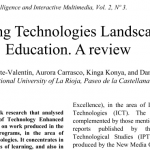Monitoring student progress using virtual appliances: A case study
Romero-Zaldivar, V. A., Pardo, A., Burgos, D., & Kloos, C. D. (2012). Monitoring student progress using virtual appliances: A case study. Computers & Education, 58(4), 1058-1067. Abstract The interactions that students have with each other, with the instructors, and with educational resources are valuable indicators of the effectiveness of a learning experience. The increasing use […]



